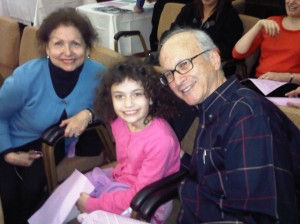The other day, the Leo Baeck Institute posted this item on its Facebook page:
“On October 22, 1940, the Jews of Loerrach, in the State of Baden, were deported to Gurs. Thousands of other Jews in Baden were deported to Gurs during this same time period. A vast amount of these people were later sent from Gurs to the death camps; many elderly people did not survive the harsh conditions of life in Gurs itself. We remember the anniversary of these deportations.”
Part of me always remembers the anniversary of these deportations. Both of my paternal grandparents came from Baden. They emigrated from Germany in the late 1930s and met here in New York.
My grandmother came from Mannheim; my grandfather, from a village you wouldn’t have heard of. Among my books is a softcover history devoted entirely to 22./23. Oktober 1940: Deportation Mannheimer Juden nach Gurs. If a similar history exists for my grandfather’s village, I haven’t yet encountered it.
But I do possess a document that records the history of the Jewish community of that village. Which is how I know that through his mother, my grandfather could trace his ancestry there back to 1764, to a man named Abraham Levi Groß.
The same document also identifies my grandfather’s aunt, Emma.
I never knew much about this aunt. I knew only that after my grandfather’s mother died, and his father had gone off to fight in World War One, Emma was the adult left in charge of my infant grandfather and his elder sister.
And she didn’t do a very good job of it.
With that background–and then, a chilling phrase in the community history–I created the character (also named Emma) in my story “Matrilineal Descent,” the second story in Quiet Americans.

After he returned from the war, my great-grandfather remarried. His second wife, Anna, was the only mother my grandfather knew. She was as devoted to her husband’s first two children as she was to the son they had together, and after my great-grandfather died, she kept the family together.
Like Emma Groß, Anna Dreifus was deported to Gurs in October 1940. Unlike Emma–who, as other documents reveal, was among those many Baden Jews who were sent on to die in Auschwitz–Oma Anna survived.
How she survived is something of a mystery–how she got out of Gurs to obtain a visa in Marseille and sail to New York from Casablanca in December 1941 to arrive in New York, where she immediately moved in with my newlywed grandparents. I never heard exactly what happened in Europe.
But on this anniversary, especially, I wonder.
